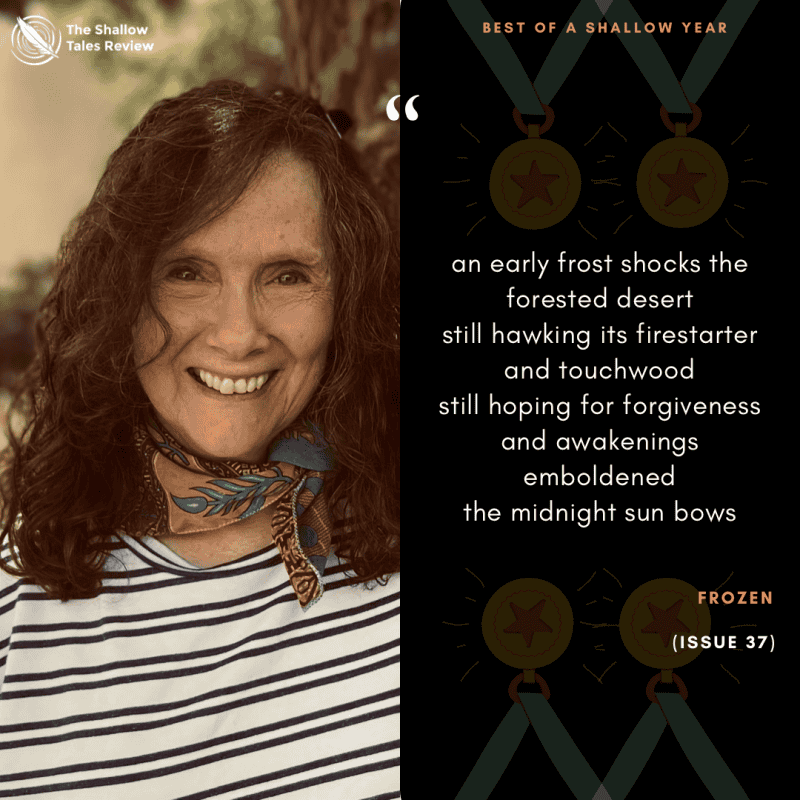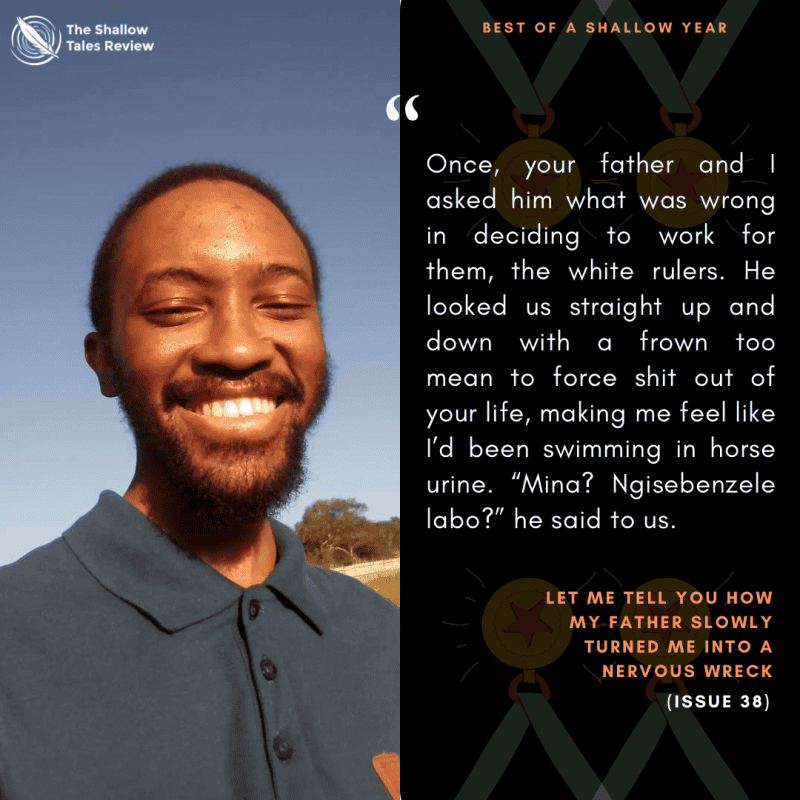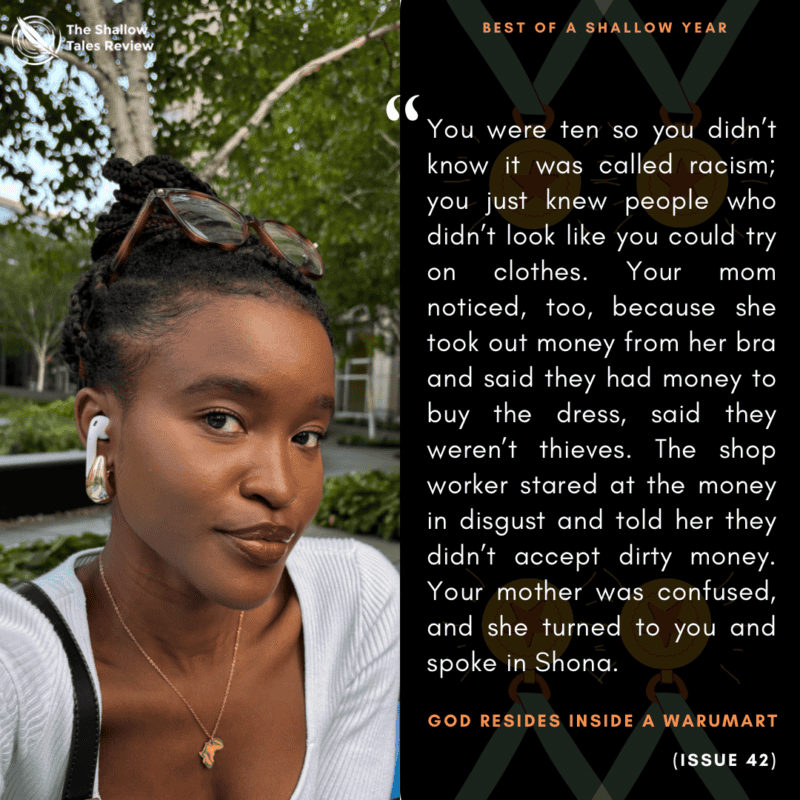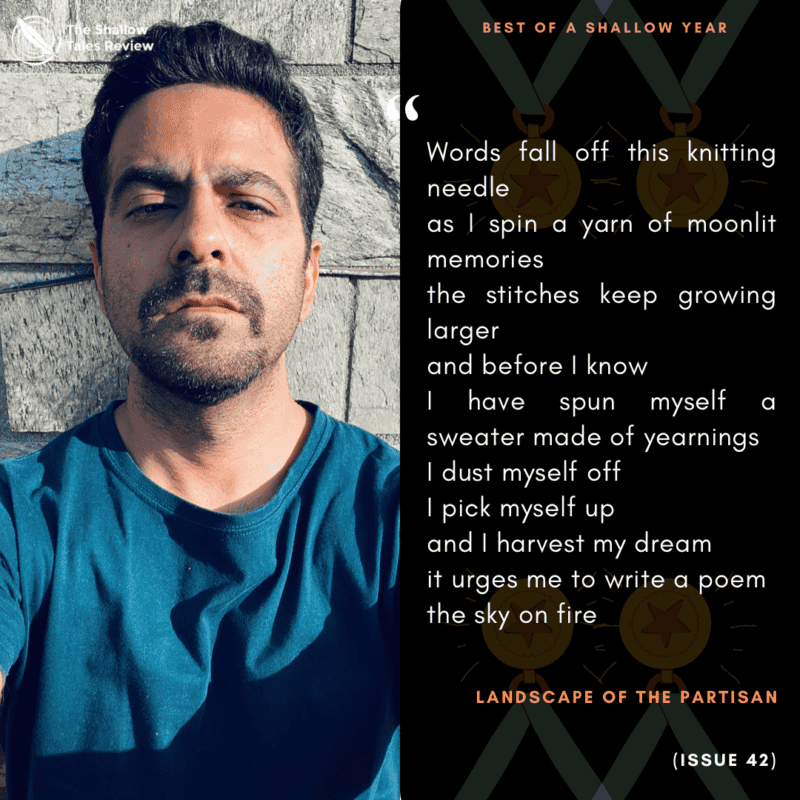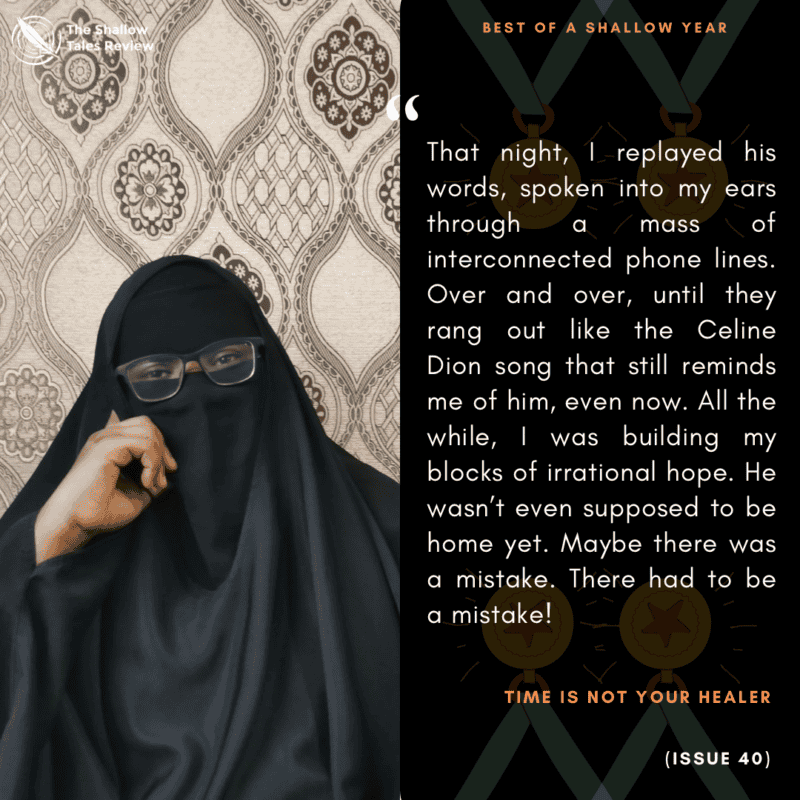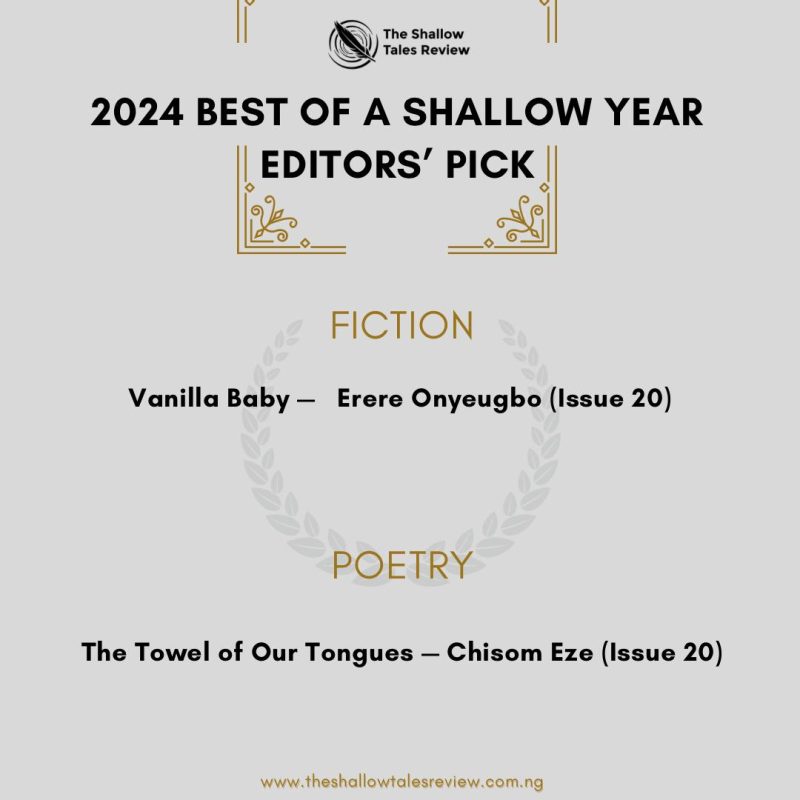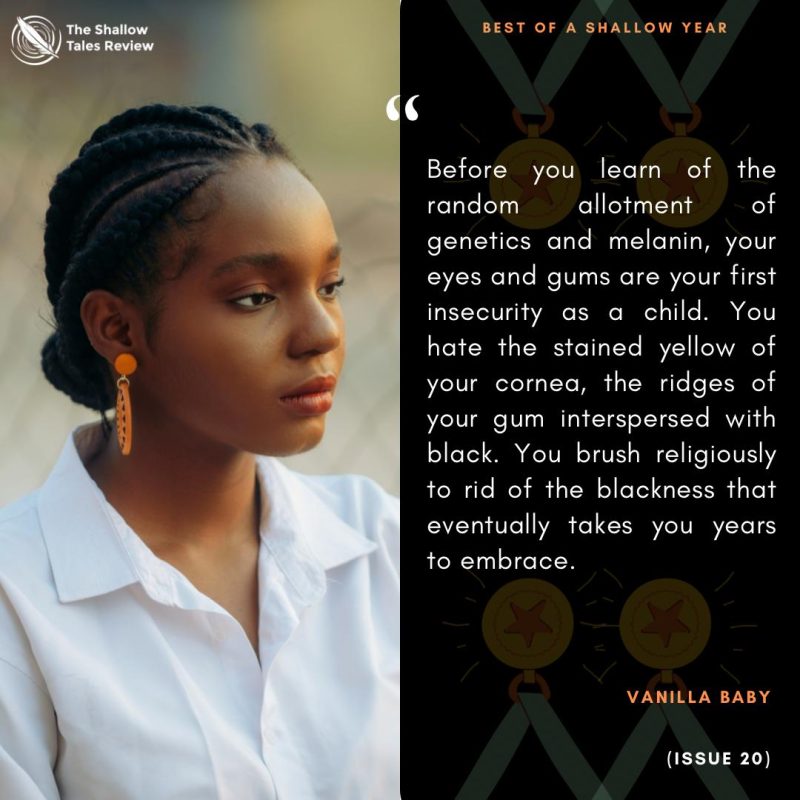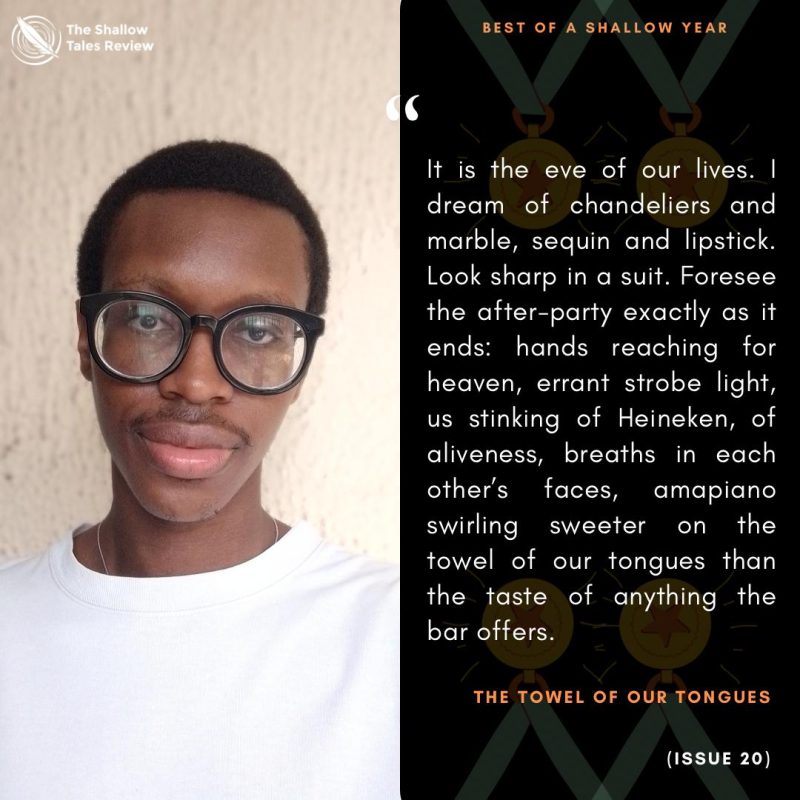The Best of a Shallow Year award recognises the most exceptional work, in each major genre of fiction, poetry and essay, published in The Shallow Tales Review in the focus year.
At the end of the magazine’s tri-annual round, editors of the respective genres pick the best single work by a single author based on the touchstone of overall creative depth, relevance, and literary profundity.

Editors’ Pick
FICTION
Clement Miracle Ifeanyichukwu — Lost Things (Issue 37)
What’s most captivating about Lost Things is Ifeanyichukwu’s deft portrayal of the dynamics of family, loss, mysticism, and religion. This was my first observation when encountering his story in January. Ifeanyichukwu’s alluring short story investigates and contends with complex phenomena with such a simplicity that might be ignored when read less carefully.
The writer has depth, and he presents his messages in subtle, gentle language. In his story, readers are thrown into an understanding of the workings of the mind of the twins, Glory and Gloria, and how they uncover and recover their loss through a cryptic, lonely old man. We have here in this short fiction a magnificent gift that gets better with each read.
— Nzube Nlebedim (fiction editor)
POETRY
Regine Ebner — “Frozen“ (Issue 37)
Regine Ebner conjures a synaesthesia of emotions through this pithy, pellucid poem about winter. As if to describe the dramatis personae within the environment, the piece moves from expository frankness into the corridors of musical presentment. It is revelatory as it is ravishing. As “tinder,” “twig,” “leaves” and “mist” drives the imagery of actors in a setting, setting the pace of the poem, we are retold of the binary reality of nature: to serve and to steal.
The poem is precipitous yet gentle. It is about retrieval—a careful selection of images slotted into simple, vivid narrative. I’m most enamoured of the language and how it inserts me into the iciness of the piece. There are not a lot of poems that leave me with such sweet-stinging aftertaste.
— Chidiebube onye Okohia (poetry editor)
ESSAY
C.S Hadebe — Let Me Tell How My Father Slowly Turned Me Into a Nervous Wreck (Issue 38)
In Let Me Tell You How My Father Slowly Turned Me Into a Nervous Wreck, Hadebe writes an uplifting letter of motivation and hope to his young nephew who’s supposedly treated as less the boy he is because he possesses some traits that aren’t “masculine enough.” The story examines what it means to come of age in a community where vulnerability for the boy child is interpreted as weakness, fragility considered a sin, and choosing to live without compromises an immoral assumption.
The strong themes in which this work is centered, including masculine toxicity, gender role, societal misinterpretation, tradition, etc., carefully woven in a musical language and electrifying sentences is what makes this piece stand out as the Best essay of the Shallow Year.
— Ebubechukwu Victor Orji (essay editor)
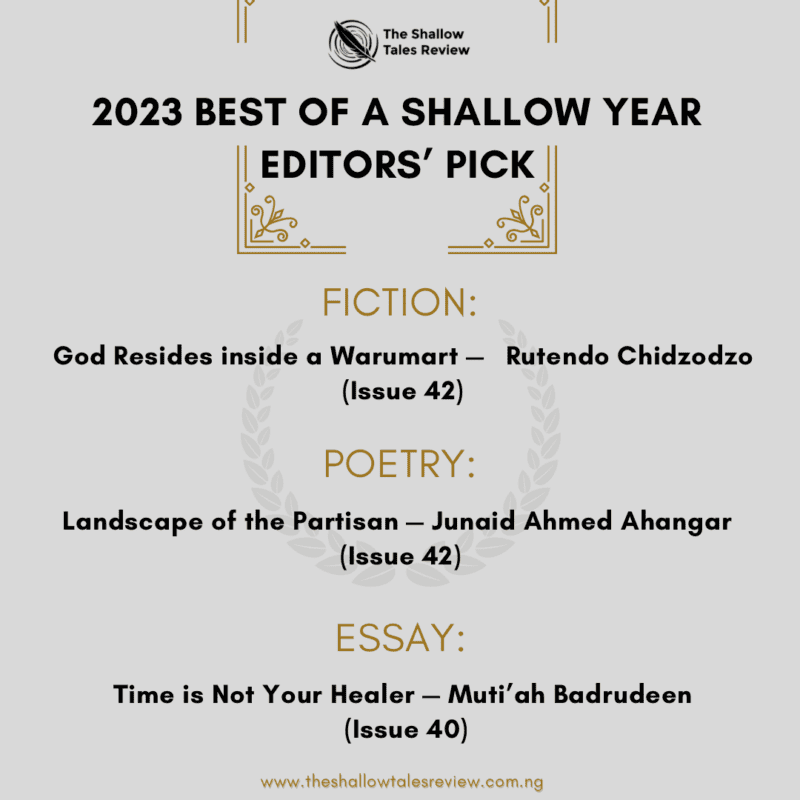
FICTION
Rutendo Chidzodzo — God Resides inside a Warumart (Issue 42)
God Resides inside a Warumart gives a startling insight into the racial problems in America, and how it cuts across two Zimbabwean families far cross time. The author, the Zimbabwean Rutendo Chidzodzo, uses two families at separate times in history to underline how damaging racism is. Her story mirrors how far the problem has gone. The protagonist, Maita, is the product of a deep racial/psychological curve.
The strength of this winning story is first in how Chidzodzo engages racism and shows us its evils, particularly through the eyes of two pre-teenage girls. It’s a fresh perspective. One feels without being told that they are re-experiencing Toni Morrison’s beloved and tragedy-coloured Pecola Breedlove.
Chidzodzo’s language is airtight and secure, and her plot drove me steadily towards a comfortable end.
— Nzube Nlebedim (fiction editor)
POETRY
Junaid Ahmed Ahangar — “Landscape of the Partisan” (Issue 42)
I think about it now and I’m reminded that I almost passed on Ahangar’s poem. His piece is one of those that distends and allow your mind to penetrate it only after the third or fourth read. This isn’t to say it is by any means complex and/or inscrutable, no. On the contrary, it is the sheer simple limning that serves as its brittle cover. The work doesn’t hold back: it professes love, even seeks to bargain, clutching tightly to memories past. “Landscape of the Partisan” is a testament to the necessity of devotion to expressiveness—it doesn’t show but flow.
— Chidiebube onye Okohia (poetry editor)
ESSAY
Muti’ah Badrudeen— Time is Not Your Healer (Issue 40)
For me, a story is truly successful if only it can scavenge through the deepest parts of man’s heart and excavate feelings they never knew existed, or they thought dead. Muti’ah Badruddeen skillfully weaves her own personal experiences into a narrative that transcends individual pain, presenting us with a compelling story that interrogates family bond, the complexities of relationships, cultural expectations and even more. With its poignant exploration of grief, loss, identity and resilience in the face of all these, and the author’s masterful use of evocative language and vivid storytelling, Time Is Not Your Healer stands worthy of this recognition as my the Best of a Shallow Year nonfiction selection.
— Ebubechukwu Victor Orji (essay editor)
FICTION
Erere Onyeugbo — “Vanilla Baby” (Issue 20)
Erere Onyeugbo’s Vanilla Baby is a genuine story, even with its rich seductiveness. Readers may easily relate with what could be the Entwicklungsroman nature of the work and the protagonist. Yet, the gentility of Onyeugbo’s prose, her convincing dialogues, and the sincerity of her characters, especially Yaefu, were top of the things that called my interest on my first encounter with the story in 2023. In all hope, Onyeugbo is one of the names to look out for in African short fiction writing.
— Nzube Nlebedim (fiction editor)
POETRY
Chisom Eze — “The Towel of Our Tongues” (Issue 20)
Chisom Eze’s “The Towel of Our Tongues” bustles with a musicality that drives the poem’s narrative. The images he conjures here are almost solid and the cinematic storytelling makes it easy on the eye and pleasing to the ear. I must say it was quite a challenge to eke out the best piece of poetry we rolled out this year, however, Eze’s is more than enough for me—vivid, honest, brilliant.
— Chidiebube onye Okohia (poetry editor)


